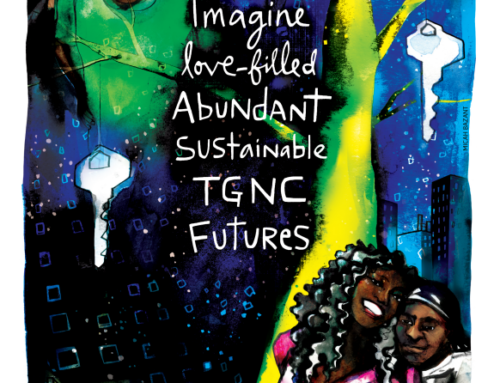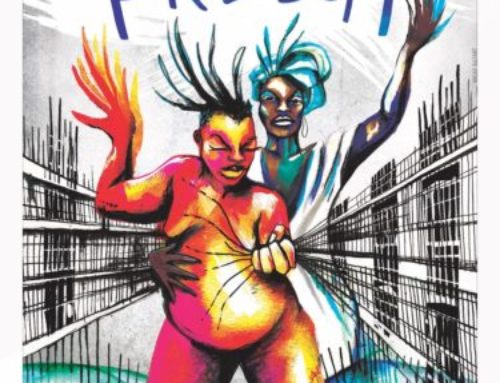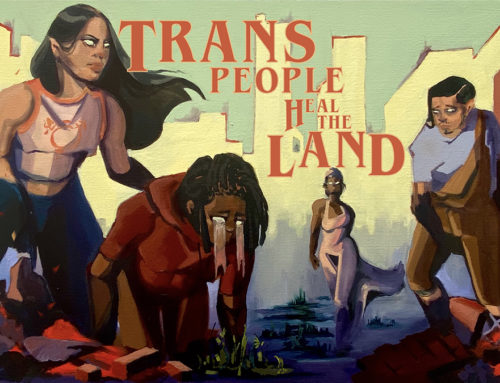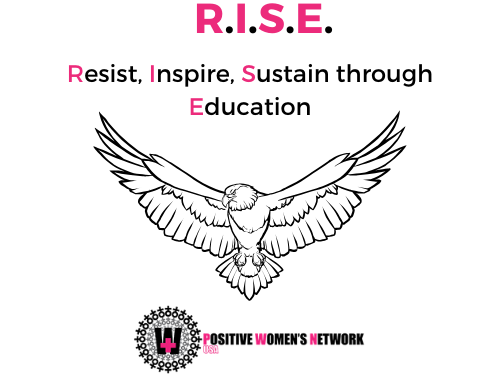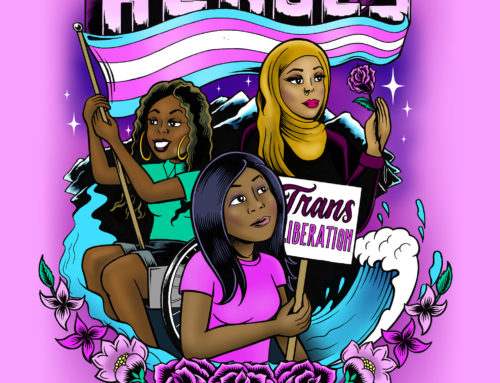 On World AIDS Day, the world remembers those of us living with HIV/AIDS, unlike the 364 other days of the year when our community becomes another sad statistic on the evening news about “other places.”
As Americans, we like to think that the problem of the epidemic is no longer affecting our communities or our citizens. We tell ourselves that in this country it’s not an issue, it’s manageable — but the truth remains that worldwide people still are suffering from this disease on a daily basis. These are people from all walks of life and in every country on earth. They’re everyday people — some gay, some straight, some transgender, some cisgender (non-transgender) — and they’re all surviving with this disease, just as I am.
Advertisement
Sometimes I am very frustrated by the lack of compassion and understanding for my communities, as the news recounts over and over stories of both HIV-positive and transgender individuals being persecuted, harassed and even killed for simply existing. It’s heartbreaking at times.
I often wonder about how to best educate the general population about the issues and realities facing transgender and HIV-positive people, and it seems like too much for an individual person to do. In fact, I feel that the responsibility to educate lies not only with ourselves as members of the trans and positive community, but also with the general population. They have a responsibility to share their acquired knowledge of us with members of their own communities, so that all communities can be bridged by compassionate understanding.
Only through interaction and education about the issues facing our communities can we begin to undo the stigma and misunderstanding that surrounds these two generally misunderstood communities. As a person who is a part of many different communities, including the transgender and HIV-positive communities, I often find that the best way to educate those who do not know about us is simply to live my life as honestly and unashamedly as possible.
I believe that by being open and honest with those who have questions, we can educate and enlighten more people about what it means to be living with HIV and/or to be transgender nowadays. If those who learn more share their knowledge with others, I think that we can continue to spread that knowledge throughout our world. Perhaps in the future, that knowledge can spread even faster than hatred, ignorance, fear and HIV are spread in the current world.
Dee Borrego lives in Massachusetts and is a founding member of Positive Women’s Network-USA. She was diagnosed with HIV in 2005.
Cross-posted from The Body.
On World AIDS Day, the world remembers those of us living with HIV/AIDS, unlike the 364 other days of the year when our community becomes another sad statistic on the evening news about “other places.”
As Americans, we like to think that the problem of the epidemic is no longer affecting our communities or our citizens. We tell ourselves that in this country it’s not an issue, it’s manageable — but the truth remains that worldwide people still are suffering from this disease on a daily basis. These are people from all walks of life and in every country on earth. They’re everyday people — some gay, some straight, some transgender, some cisgender (non-transgender) — and they’re all surviving with this disease, just as I am.
Advertisement
Sometimes I am very frustrated by the lack of compassion and understanding for my communities, as the news recounts over and over stories of both HIV-positive and transgender individuals being persecuted, harassed and even killed for simply existing. It’s heartbreaking at times.
I often wonder about how to best educate the general population about the issues and realities facing transgender and HIV-positive people, and it seems like too much for an individual person to do. In fact, I feel that the responsibility to educate lies not only with ourselves as members of the trans and positive community, but also with the general population. They have a responsibility to share their acquired knowledge of us with members of their own communities, so that all communities can be bridged by compassionate understanding.
Only through interaction and education about the issues facing our communities can we begin to undo the stigma and misunderstanding that surrounds these two generally misunderstood communities. As a person who is a part of many different communities, including the transgender and HIV-positive communities, I often find that the best way to educate those who do not know about us is simply to live my life as honestly and unashamedly as possible.
I believe that by being open and honest with those who have questions, we can educate and enlighten more people about what it means to be living with HIV and/or to be transgender nowadays. If those who learn more share their knowledge with others, I think that we can continue to spread that knowledge throughout our world. Perhaps in the future, that knowledge can spread even faster than hatred, ignorance, fear and HIV are spread in the current world.
Dee Borrego lives in Massachusetts and is a founding member of Positive Women’s Network-USA. She was diagnosed with HIV in 2005.
Cross-posted from The Body.
By Dee Borrego  On World AIDS Day, the world remembers those of us living with HIV/AIDS, unlike the 364 other days of the year when our community becomes another sad statistic on the evening news about “other places.”
As Americans, we like to think that the problem of the epidemic is no longer affecting our communities or our citizens. We tell ourselves that in this country it’s not an issue, it’s manageable — but the truth remains that worldwide people still are suffering from this disease on a daily basis. These are people from all walks of life and in every country on earth. They’re everyday people — some gay, some straight, some transgender, some cisgender (non-transgender) — and they’re all surviving with this disease, just as I am.
Advertisement
Sometimes I am very frustrated by the lack of compassion and understanding for my communities, as the news recounts over and over stories of both HIV-positive and transgender individuals being persecuted, harassed and even killed for simply existing. It’s heartbreaking at times.
I often wonder about how to best educate the general population about the issues and realities facing transgender and HIV-positive people, and it seems like too much for an individual person to do. In fact, I feel that the responsibility to educate lies not only with ourselves as members of the trans and positive community, but also with the general population. They have a responsibility to share their acquired knowledge of us with members of their own communities, so that all communities can be bridged by compassionate understanding.
Only through interaction and education about the issues facing our communities can we begin to undo the stigma and misunderstanding that surrounds these two generally misunderstood communities. As a person who is a part of many different communities, including the transgender and HIV-positive communities, I often find that the best way to educate those who do not know about us is simply to live my life as honestly and unashamedly as possible.
I believe that by being open and honest with those who have questions, we can educate and enlighten more people about what it means to be living with HIV and/or to be transgender nowadays. If those who learn more share their knowledge with others, I think that we can continue to spread that knowledge throughout our world. Perhaps in the future, that knowledge can spread even faster than hatred, ignorance, fear and HIV are spread in the current world.
Dee Borrego lives in Massachusetts and is a founding member of Positive Women’s Network-USA. She was diagnosed with HIV in 2005.
Cross-posted from The Body.
On World AIDS Day, the world remembers those of us living with HIV/AIDS, unlike the 364 other days of the year when our community becomes another sad statistic on the evening news about “other places.”
As Americans, we like to think that the problem of the epidemic is no longer affecting our communities or our citizens. We tell ourselves that in this country it’s not an issue, it’s manageable — but the truth remains that worldwide people still are suffering from this disease on a daily basis. These are people from all walks of life and in every country on earth. They’re everyday people — some gay, some straight, some transgender, some cisgender (non-transgender) — and they’re all surviving with this disease, just as I am.
Advertisement
Sometimes I am very frustrated by the lack of compassion and understanding for my communities, as the news recounts over and over stories of both HIV-positive and transgender individuals being persecuted, harassed and even killed for simply existing. It’s heartbreaking at times.
I often wonder about how to best educate the general population about the issues and realities facing transgender and HIV-positive people, and it seems like too much for an individual person to do. In fact, I feel that the responsibility to educate lies not only with ourselves as members of the trans and positive community, but also with the general population. They have a responsibility to share their acquired knowledge of us with members of their own communities, so that all communities can be bridged by compassionate understanding.
Only through interaction and education about the issues facing our communities can we begin to undo the stigma and misunderstanding that surrounds these two generally misunderstood communities. As a person who is a part of many different communities, including the transgender and HIV-positive communities, I often find that the best way to educate those who do not know about us is simply to live my life as honestly and unashamedly as possible.
I believe that by being open and honest with those who have questions, we can educate and enlighten more people about what it means to be living with HIV and/or to be transgender nowadays. If those who learn more share their knowledge with others, I think that we can continue to spread that knowledge throughout our world. Perhaps in the future, that knowledge can spread even faster than hatred, ignorance, fear and HIV are spread in the current world.
Dee Borrego lives in Massachusetts and is a founding member of Positive Women’s Network-USA. She was diagnosed with HIV in 2005.
Cross-posted from The Body.
 On World AIDS Day, the world remembers those of us living with HIV/AIDS, unlike the 364 other days of the year when our community becomes another sad statistic on the evening news about “other places.”
As Americans, we like to think that the problem of the epidemic is no longer affecting our communities or our citizens. We tell ourselves that in this country it’s not an issue, it’s manageable — but the truth remains that worldwide people still are suffering from this disease on a daily basis. These are people from all walks of life and in every country on earth. They’re everyday people — some gay, some straight, some transgender, some cisgender (non-transgender) — and they’re all surviving with this disease, just as I am.
Advertisement
Sometimes I am very frustrated by the lack of compassion and understanding for my communities, as the news recounts over and over stories of both HIV-positive and transgender individuals being persecuted, harassed and even killed for simply existing. It’s heartbreaking at times.
I often wonder about how to best educate the general population about the issues and realities facing transgender and HIV-positive people, and it seems like too much for an individual person to do. In fact, I feel that the responsibility to educate lies not only with ourselves as members of the trans and positive community, but also with the general population. They have a responsibility to share their acquired knowledge of us with members of their own communities, so that all communities can be bridged by compassionate understanding.
Only through interaction and education about the issues facing our communities can we begin to undo the stigma and misunderstanding that surrounds these two generally misunderstood communities. As a person who is a part of many different communities, including the transgender and HIV-positive communities, I often find that the best way to educate those who do not know about us is simply to live my life as honestly and unashamedly as possible.
I believe that by being open and honest with those who have questions, we can educate and enlighten more people about what it means to be living with HIV and/or to be transgender nowadays. If those who learn more share their knowledge with others, I think that we can continue to spread that knowledge throughout our world. Perhaps in the future, that knowledge can spread even faster than hatred, ignorance, fear and HIV are spread in the current world.
Dee Borrego lives in Massachusetts and is a founding member of Positive Women’s Network-USA. She was diagnosed with HIV in 2005.
Cross-posted from The Body.
On World AIDS Day, the world remembers those of us living with HIV/AIDS, unlike the 364 other days of the year when our community becomes another sad statistic on the evening news about “other places.”
As Americans, we like to think that the problem of the epidemic is no longer affecting our communities or our citizens. We tell ourselves that in this country it’s not an issue, it’s manageable — but the truth remains that worldwide people still are suffering from this disease on a daily basis. These are people from all walks of life and in every country on earth. They’re everyday people — some gay, some straight, some transgender, some cisgender (non-transgender) — and they’re all surviving with this disease, just as I am.
Advertisement
Sometimes I am very frustrated by the lack of compassion and understanding for my communities, as the news recounts over and over stories of both HIV-positive and transgender individuals being persecuted, harassed and even killed for simply existing. It’s heartbreaking at times.
I often wonder about how to best educate the general population about the issues and realities facing transgender and HIV-positive people, and it seems like too much for an individual person to do. In fact, I feel that the responsibility to educate lies not only with ourselves as members of the trans and positive community, but also with the general population. They have a responsibility to share their acquired knowledge of us with members of their own communities, so that all communities can be bridged by compassionate understanding.
Only through interaction and education about the issues facing our communities can we begin to undo the stigma and misunderstanding that surrounds these two generally misunderstood communities. As a person who is a part of many different communities, including the transgender and HIV-positive communities, I often find that the best way to educate those who do not know about us is simply to live my life as honestly and unashamedly as possible.
I believe that by being open and honest with those who have questions, we can educate and enlighten more people about what it means to be living with HIV and/or to be transgender nowadays. If those who learn more share their knowledge with others, I think that we can continue to spread that knowledge throughout our world. Perhaps in the future, that knowledge can spread even faster than hatred, ignorance, fear and HIV are spread in the current world.
Dee Borrego lives in Massachusetts and is a founding member of Positive Women’s Network-USA. She was diagnosed with HIV in 2005.
Cross-posted from The Body. 


